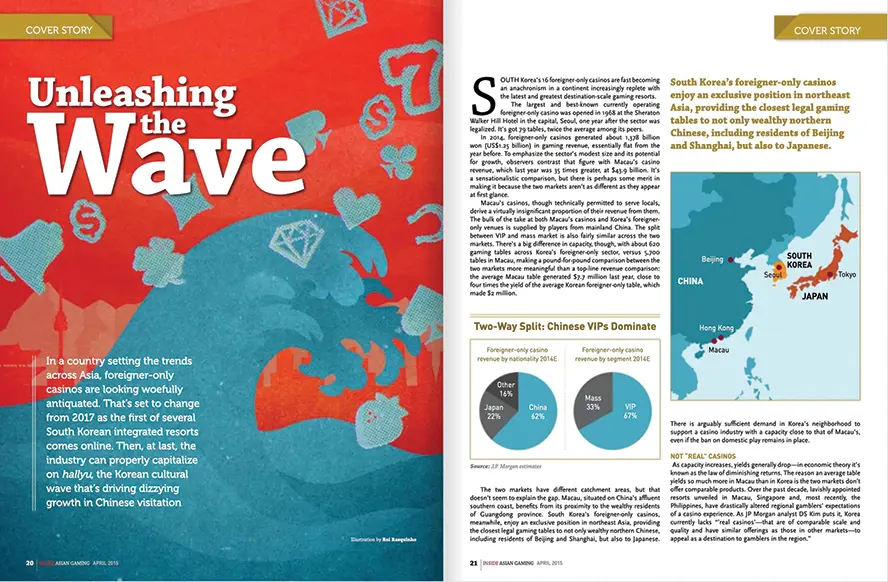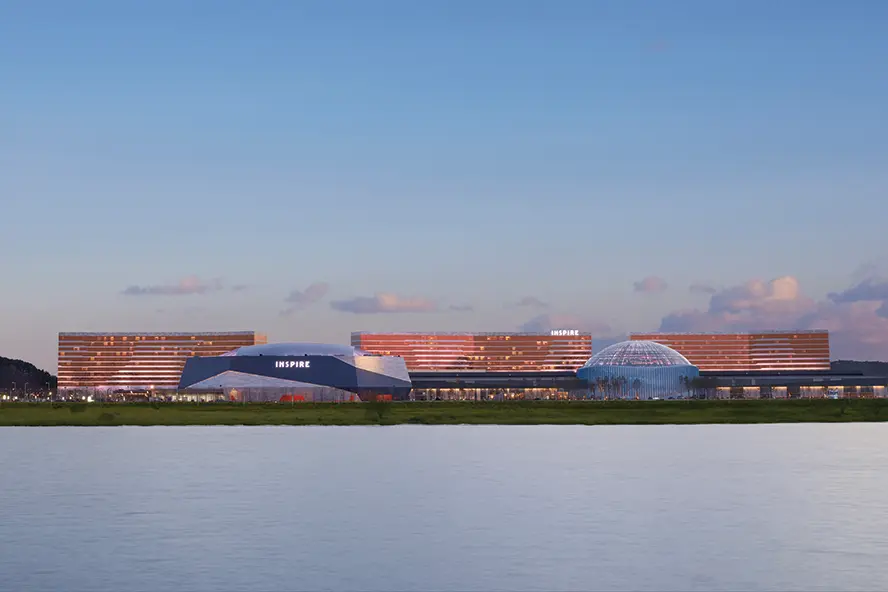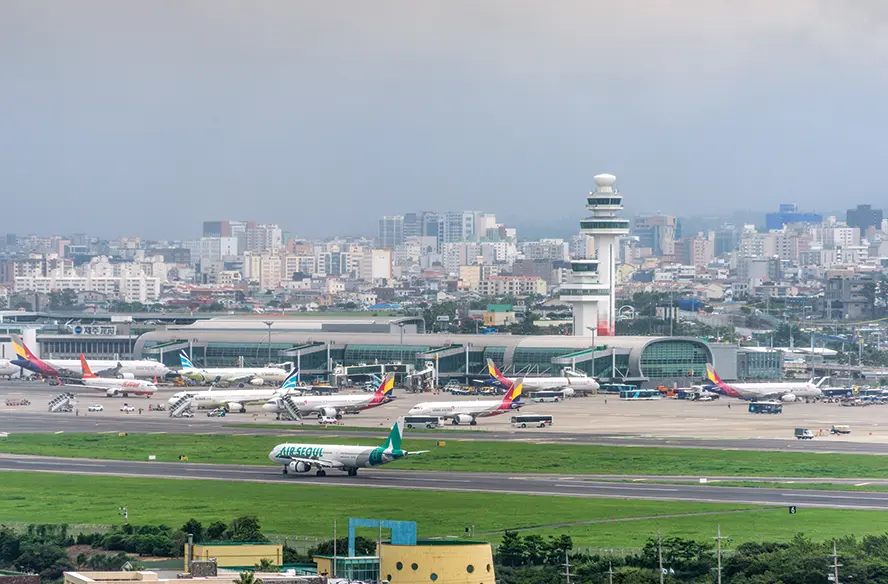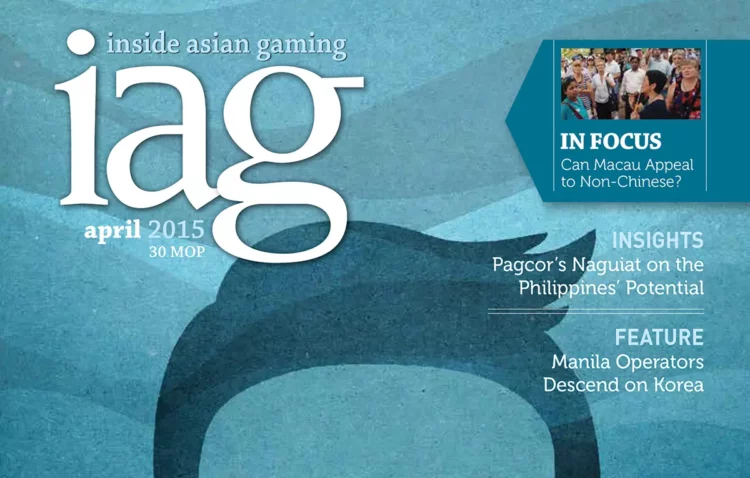In this regular feature in IAG to celebrate 20 years covering the Asian gaming and leisure industry, we look back at our cover story from exactly 10 years ago, “Unleashing the wave”, to rediscover what was making the news in April 2015!
One might wonder how the world’s integrated resort operators may have viewed their interest in the South Korean foreigner-only casino market had they known a decade ago what they know today.
That is to say, results have been mixed.
 In the April 2015 edition of Inside Asian Gaming, we explored the evolution of South Korea’s casinos at a time when the country was preparing to welcome its first integrated resorts. Although still a few years away, the development by Korea’s leading foreigner-only casino operator Paradise Co of a US$1 billion IR in Incheon was seen as a much-needed answer to the booming resorts of Macau, whose expansive luxury was drawing in southern Chinese customers in their millions.
In the April 2015 edition of Inside Asian Gaming, we explored the evolution of South Korea’s casinos at a time when the country was preparing to welcome its first integrated resorts. Although still a few years away, the development by Korea’s leading foreigner-only casino operator Paradise Co of a US$1 billion IR in Incheon was seen as a much-needed answer to the booming resorts of Macau, whose expansive luxury was drawing in southern Chinese customers in their millions.
Korea’s casinos, too, have long targeted the Chinese consumer and appeared to have a monopoly over wealthy northern Chinese, including residents of Beijing and Shanghai, while also boasting an enticing proximity to Japan.
 However, without world-class IRs to match their regional rivals, Korea’s foreigner-only casinos were generating barely a quarter of the yield of the average Macau gaming table: US$2 million versus US$7.7 million. That was despite Korea boasting only about 620 gaming tables at its foreigner-only casinos compared with 5,700 in Macau – an apparent contradiction of the law of diminishing returns.
However, without world-class IRs to match their regional rivals, Korea’s foreigner-only casinos were generating barely a quarter of the yield of the average Macau gaming table: US$2 million versus US$7.7 million. That was despite Korea boasting only about 620 gaming tables at its foreigner-only casinos compared with 5,700 in Macau – an apparent contradiction of the law of diminishing returns.
So, IRs were seen as an untapped opportunity back in 2015, and with the government keen to welcome more foreign investment, a number of IR projects began to emerge.
Paradise City, which opened in 2017, was to be joined in Incheon by another IR, linked to US casino giant Caesars, and a third by US tribal casino operator Mohegan, with the goal of creating a full cluster of properties in the area over the next decade or so.
Likewise, the holiday island of Jeju – home to eight small foreigner-only casinos – was to be home to an IR called Resorts World Jeju (RWJ), a joint venture between Genting Singapore and Hong Kong-listed Landing International Development Limited.

Not everyone was convinced. While proponents of the Jeju opportunity pointed to its huge popularity among Chinese holidaymakers, Daiwa Securities analysts Jamie Soo and Adrian Chan said at the time that they didn’t expect RWJ to contribute significant gaming revenues.
“The size of the casino still remains unclear, but we do not expect a significant contribution to earnings since only foreigners are allowed in,” they wrote. “Our previous estimates show that RWJ would add only about 1% to 2% to Genting’s top line, assuming RWJ earns the average of foreigner-only casinos in Korea.”
Sage words and perhaps ones that resonated with Genting Singapore, who 16 months later offloaded its entire stake in the project to Landing in a US$588 million deal that looks even wiser in hindsight: Jeju Shinhwa World – the rebranded version of RWJ – has notched massive losses ever since its 2017 launch.
Back in Incheon, Caesars became another early departure when it sold out of its project in 2020, with the development stalling soon after. Mohegan pushed on with its INSPIRE project, which opened in late 2023 – only for the company’s lenders to seize control of the property earlier this year after it failed to meet financial covenant tests due to slower than anticipated ramp.
Challenges such as geopolitical tensions between Korea and China that have seen a notable reduction in Chinese visitation – coupled with the recent COVID-affected years – have highlighted the unique challenges that go with operating in a foreigner-only environment.

And yet Korea is not without its success stories. Paradise Co, which operates four casinos nationwide, has surged back into profitability since the pandemic, while its traditional rival Grand Korea Leisure has also seen decent results.
Bain Capital, the lender now in control of Mohegan, has outlined plans to step back and allow INSPIRE to grow, because it remains confident in the property’s long-term potential.
But whether the emergence of these impressive integrated resorts truly matches what the government and industry had envisioned a decade ago remains to be seen.




























